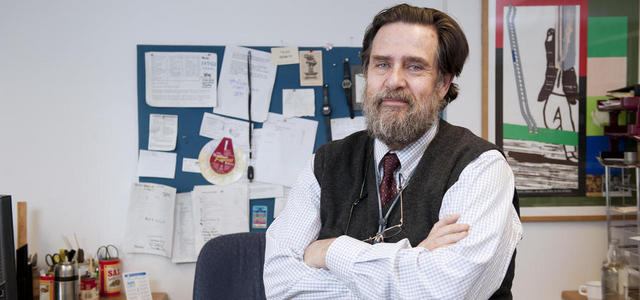
Health care expert Sholom Glouberman got a taste of hospital care from the patient’s side of the scalpel—and now he’s trying to reform how medicine works in Canada.
If you’ve had any experience with hospital care in North America, you’ve likely noticed that the time and wishes of patients are not high priorities for medical professionals. Sholom Glouberman found the same thing when he went under the knife for what was supposed to be a relatively minor operation on his colon in 2005. The operation led to an infection that was at first misdiagnosed, and through a series of abrupt nursing changes, curt doctors, miscommunications (and outright failures to communicate) he was—six months later—left healthy and recovering, but feeling completely disgusted by the way he was treated.
Glouberman was no stranger to the health care system. He’s spent his life working in health care policy and is the philosopher in residence at the Baycrest Geriatric Centre. He’s a Wittgensteinian philosopher, naturally: “Wittgenstein believed that philosophy was a way of sorting out conceptual problems, but understanding things in the world.… One of the things I do is mediate,†he says. This means helping nurses, administrators and doctors understand and reconcile their different philosophical approaches to care.
But even as an insider, used to working closely with the system, he was surprised by how he was left out of the process once he became a patient. He details his experience in a new book, My Operation: A Health Insider Becomes a Patient. And now he hopes to do something to correct the situation through the Patients’ Association of Canada, which he launched in Toronto last week with an inaugural conference.
Looking youthful at age 71, Glouberman sits in his bookshelf-walled office at Baycrest to explain the root of the problem: Our hospitals are very good at saving people’s lives—dealing with heart attacks or gunshot wounds, say—and terrible at keeping people healthy. That’s because the system is set up to both maximize the value of doctors’ time and to respond to acute—read: emergency—situations.
“Between 1880 and 1920,†Glouberman says, in the period immediately after bacteria and the principles of communicable disease were discovered, “the modern health care system was developed, and that’s the system we still have now. The system is built on treating acute infectious disease. When you have an acute infectious disease, you as a person don’t have to be present—in fact, you don’t want to be present.†Under this system, says Glouberman, patient participation doesn’t help the cure. It just gets in the way.
He explains that the system was so successful in treating this kind of illness that doctors, nurses and patients alike developed an attitude toward medicine based on the idea that patients should be completely passive participants. But at least partly because hospitals have become so successful at treating infectious diseases, we now need a different kind of care.
“Between 1920 and 1970, there was a huge shift in mortality,†he says. “In 1920, most people died of acute infectious diseases. By 1970, the vast majority of people were dying of chronic diseases, diseases that didn’t have a clear cause, that couldn’t be diagnosed in the same way…like heart disease, diabetes-related diseases, cancer.â€
It’s specifically in treating those types of diseases that involving the patient in his or her own care—the very thing our hospitals suck at—becomes more than a matter of hurt feelings. “For a chronic condition, how you live, what you eat, whether you’re anxious or not—all of those things make a difference in your recovery. But those things are not part of the mix because people aren’t trained to deal with them, and the system isn’t structured for it.â€
The healthcare system as a whole has long recognized this problem—there is an ongoing drive toward “patient-centred care†in hospitals—but their approach to dealing with it, astonishingly, has still left patients out of the process. Hospital administrators, researchers, doctors and nurses are the ones who are determining what patient-centred care looks like.
That’s why Glouberman created the Patients’ Association of Canada. His fellow founders are a group of people who are all health care system employees or experts in some way, like himself, and also people who have also been patients and want to share insights from the receiving end of the scalpel. “We’re here to say, ‘We’re ready to join.’ We have people with enough expertise to be able to speak to you on equal terms. We understand how to change the policy and make the service delivery better. We can help with all of this to make the patient experience, which is critical to chronic care, better.â€
The specifics of how the association will work are varied: they have already sent a representative to speak at a medical conference discussing patient-centred care, and they are awarding Patients’ Choice Awards to doctors nominated by patients. Most importantly, they will have representatives sit on committees in hospitals—they’re already working with the University Health Network—to discuss how to reshape policies and practices.
Glouberman says that the reaction from within the hospital community so far has been encouraging, possibly because the Patients’ Association is approaching the process as a partner willing to help solve problems, not as an antagonist shouting insults from the sidelines.
And what about the rest of us patients? What can we do? Glouberman says we can join the association through its website at PatientsAssociation.ca to be kept up to date by email on progress and find opportunities to help.
“Patient experience is not part of medical education—yet,†he says, shifting his tone to imitate an advertising pitchman. “With the Patients’ Association, we’ll make it part of medicine—bringing the patient experience to the table is important now. Because everything has changed.â€
This article was originally posted here. Photo credit: Yeounjung Kim
